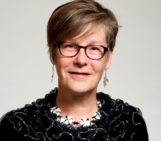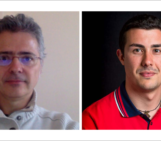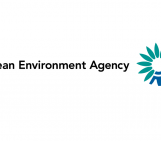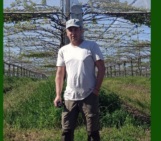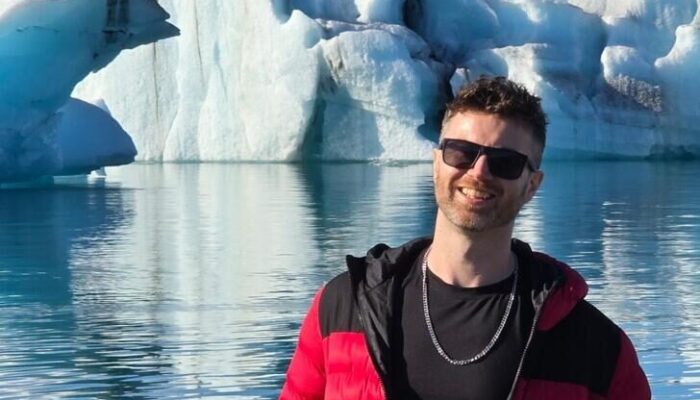
‘What I wish someone told me early in my career’ is a new Geolog series that aims to provide valuable insights and guidance to early-career professionals within the European Geosciences Union (EGU) community. Each month, I will interview a staff member of EGU to share their personal career journey, experiences, challenges faced, and the tips they wish they had received earlier in their careers. This month, I am having a chat with our Projects Manager, Simon Clark (He/They). Simon joined EGU in 2021 as a Committee Programmes Coordinator and his role has developed since then to Projects Manager. Let’s get to know them!
Hello Simon, and thank you for joining us for this interview! To start, could you share a bit about yourself and what led you to your current role in the Earth, space, and planetary sciences?
Thank you for inviting me! My background is in climate change, risk, and disaster management, and I hold a PhD in computational fluid dynamics from the University of Liverpool. I’ve worked on risk decision-making, science-policy relations, and LGBTQIA+ inclusion in the geosciences. I’m also a science communicator and have collaborated with artists and engaged the public through events in bars, museums, and most recently, a festival!
In addition, I’m involved in inclusion advocacy, particularly through network building and workshops, with a focus on queer and neurodivergent communities. One of the projects I’m proudest of is the LGBTQIA+ sports charity I co-founded and co-directed while completing my PhD.
At EGU, my focus is on community development, organisational projects, and reducing risk while improving the Union’s efficacy. My goal is to support and empower our community, especially early career scientists. I also manage digital programmes, deliver short courses, and write articles, including for the GeoTalk series, which allows me to engage in science communication and outreach.
You’ve had a diverse career in geosciences, project management, and science communication. What motivated you to pursue such a multifaceted path?
I’ve always been drawn to multiple interests, and my career is a reflection of that—trying to catch as many as I can in one net! I love science, but I’ve always been curious about how it can create impact. This led me to expand from research into science communication and governance, all driven by the same question: Who are we reaching, what are we trying to achieve, and how can we best accomplish that?
A key theme in my career has been my love of water. As a child, I was always drawn to puddles, rivers, and rock pools—partly for what lived in them, but also to understand their patterns and reflections. My fascination with water led to my research in disasters and fluid dynamics. Growing up neurodivergent, I struggled with communication, which drove me to break down and rebuild topics in ways I could understand. This survival mechanism evolved into a skill set for communicating complex ideas. Plus, my love of categorising and organising has shaped much of my professional path.
These different interests may seem disconnected, but together, they form the flow of my career—leading me to my current role at EGU, where I get to bring all of these facets together.
As someone who’s worked in both academia and industry, what differences have you noticed in organizational culture, and how did you adapt?
In industry, the pace is quicker, and there’s a greater emphasis on teamwork and interpersonal dynamics. It’s not just about what you know, but also how you collaborate and interact with others. You need to be open to learning and understand that work is relational. In my workshops, I often highlight empathy as a skill that can be developed, not something you’re born with; it’s key to building emotional intelligence for effective teamwork.
In contrast, academia tends to focus more on the individual, which gave me space to explore my interests. However, academia often prioritizes technical knowledge over socio-psychological skills, and this can isolate people, diminishing their ability to collaborate and connect. Simple changes, like celebrating achievements more, as is done in industry, could help create a more supportive academic environment.

Simon passionately discussing climate action and river physics at the 2024 SuperBloom Music Festival in Munich
You co-founded an LGBTQIA+ sports charity. What’s the most important lesson you learned from this experience, both as a leader and as a changemaker?
Governance often gets compared to steering a ship, but I see it as making sure the wheels turn when the steering wheel moves. There’s a lot of administrative oversight involved, and you often have to ask yourself, “If I can do this, why shouldn’t I be the one to do it?” You also need to find the right people—those who share your values and get things done.
In your work engaging non-expert audiences, what’s been the most rewarding and challenging aspect?
Seeing someone have that moment of insight is incredibly rewarding—the questions, discussions, and curiosity that follow. It’s especially fulfilling when parents at outreach events rediscover their own scientific curiosity, often abandoned due to their schooling experiences. Engaging with different spaces, like policy or art, always brings new perspectives, and it’s this cross-pollination of ideas that excites me.
Looking back on your journey, was there ever a moment where you wanted to give up? How did you overcome it, and what advice would you offer others?
There have been many moments when I felt overwhelmed by the enormity of a task. But all great achievements come from small, incremental steps. When motivation falters, it’s essential to rely on structure and habit. Falling off the track doesn’t mean failure—what matters is getting back on.
It’s also important to know when to let go. Sometimes giving up is the best option, and you need to set clear boundaries to protect your well-being. I left academia after repeated experiences of homophobia, but even though my path diverged, it still shaped my career.
This was lovely, Simon! Thank you so much for your time.

